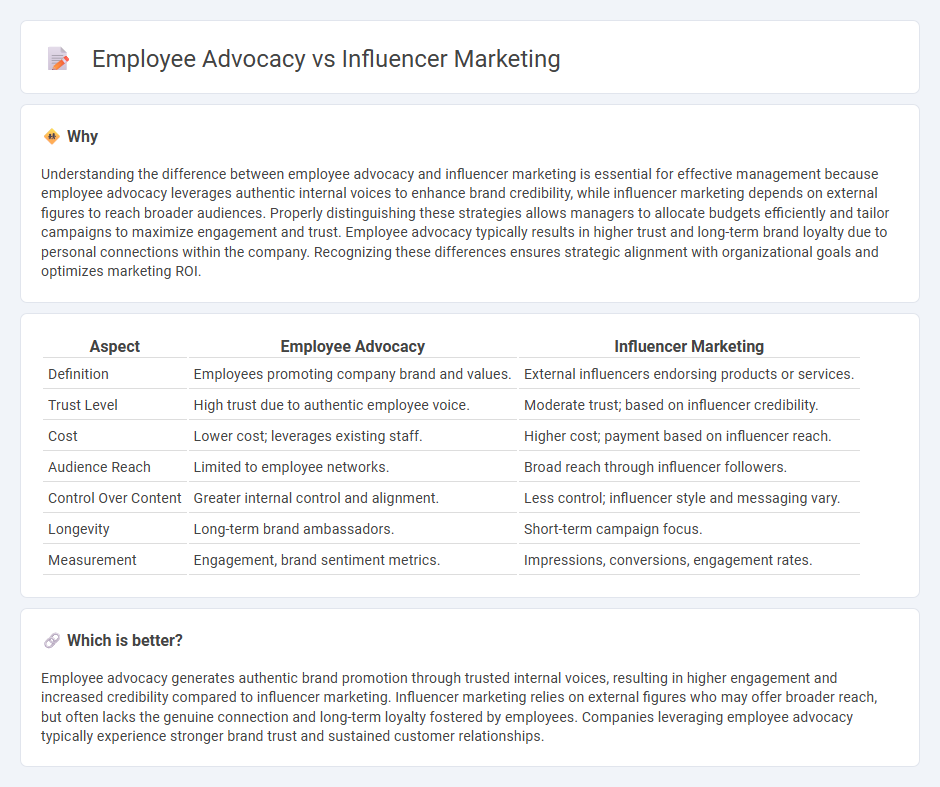
Employee advocacy leverages authentic voices within a company to promote brand values and drive trust among target audiences, resulting in higher engagement and credibility. Influencer marketing, on the other hand, taps into established external personalities with large followings to expand reach and attract diverse consumer segments. Discover the strategic differences and benefits of each approach to enhance your marketing efforts.
Why it is important
Understanding the difference between employee advocacy and influencer marketing is essential for effective management because employee advocacy leverages authentic internal voices to enhance brand credibility, while influencer marketing depends on external figures to reach broader audiences. Properly distinguishing these strategies allows managers to allocate budgets efficiently and tailor campaigns to maximize engagement and trust. Employee advocacy typically results in higher trust and long-term brand loyalty due to personal connections within the company. Recognizing these differences ensures strategic alignment with organizational goals and optimizes marketing ROI.
Comparison Table
| Aspect | Employee Advocacy | Influencer Marketing |
|---|---|---|
| Definition | Employees promoting company brand and values. | External influencers endorsing products or services. |
| Trust Level | High trust due to authentic employee voice. | Moderate trust; based on influencer credibility. |
| Cost | Lower cost; leverages existing staff. | Higher cost; payment based on influencer reach. |
| Audience Reach | Limited to employee networks. | Broad reach through influencer followers. |
| Control Over Content | Greater internal control and alignment. | Less control; influencer style and messaging vary. |
| Longevity | Long-term brand ambassadors. | Short-term campaign focus. |
| Measurement | Engagement, brand sentiment metrics. | Impressions, conversions, engagement rates. |
Which is better?
Employee advocacy generates authentic brand promotion through trusted internal voices, resulting in higher engagement and increased credibility compared to influencer marketing. Influencer marketing relies on external figures who may offer broader reach, but often lacks the genuine connection and long-term loyalty fostered by employees. Companies leveraging employee advocacy typically experience stronger brand trust and sustained customer relationships.
Connection
Employee advocacy amplifies brand messaging by leveraging authentic voices within an organization, which aligns closely with influencer marketing strategies that rely on trust and credibility. Both approaches utilize personal networks and social proof to enhance brand visibility and drive consumer engagement. Integrating employee advocacy into influencer marketing campaigns strengthens brand authenticity and expands reach through genuine, relatable content shared by employees-turned-influencers.
Key Terms
Credibility
Influencer marketing leverages trusted personalities with large followings to boost brand credibility and reach diverse audiences effectively. Employee advocacy harnesses genuine endorsements from knowledgeable staff, creating authentic connections and enhancing trustworthiness within existing networks. Discover how these strategies differ in building credibility to elevate your brand's reputation.
Reach
Influencer marketing leverages external personalities with large, engaged followings to rapidly amplify brand reach across diverse audiences, often resulting in higher visibility and broader demographic exposure. Employee advocacy relies on trusted company insiders sharing authentic content within their personal networks, generating credible and targeted reach that fosters deeper engagement and brand loyalty. Explore how combining these strategies can maximize your brand's overall reach and impact.
Brand Alignment
Influencer marketing leverages external personalities with wide-reaching audiences to enhance brand visibility and attract target demographics, while employee advocacy taps into the authentic voices of internal team members to foster trust and deepen brand alignment. Studies reveal that employee-shared content generates 8x more engagement than content shared through brand channels, highlighting its effectiveness in conveying genuine brand values. Explore how aligning your brand strategy with the right approach can amplify impact and loyalty.
Source and External Links
Influencer marketing - Wikipedia - Influencer marketing is a form of social media marketing where brands collaborate with influencers, individuals who have expert knowledge or social influence, to endorse products through sponsored content on platforms like Instagram, YouTube, and TikTok.
What Is Influencer Marketing? - Mailchimp - Influencer marketing enables businesses to increase brand exposure by collaborating with individuals who have relevant followers, with strategies including setting clear goals, targeting the right audience, and managing budgets effectively for measurable results.
Influencer Marketing: All You Need to Know to Plan, Execute, and ... - Influencity - Influencer marketing involves partnering with professionals who endorse your brand to build trust and expand reach, requiring tailored strategies per social media platform to maximize ROI and business growth.
 dowidth.com
dowidth.com